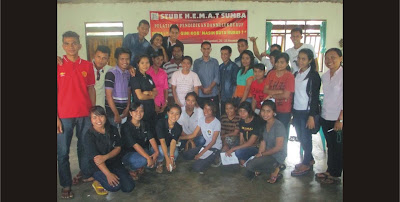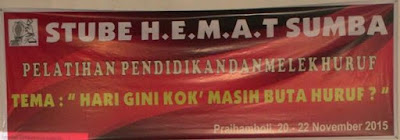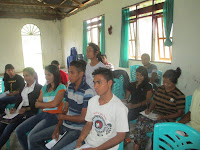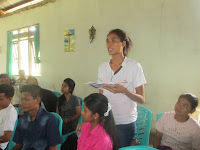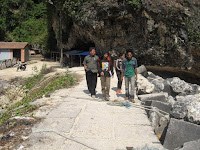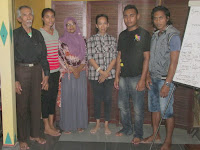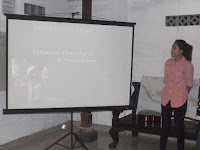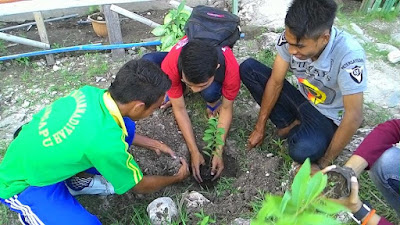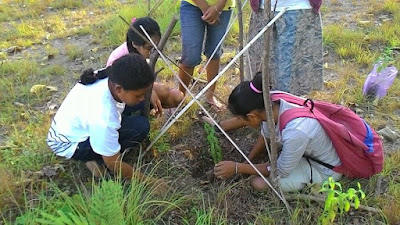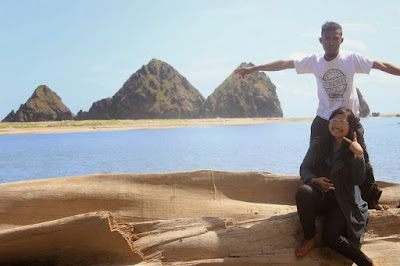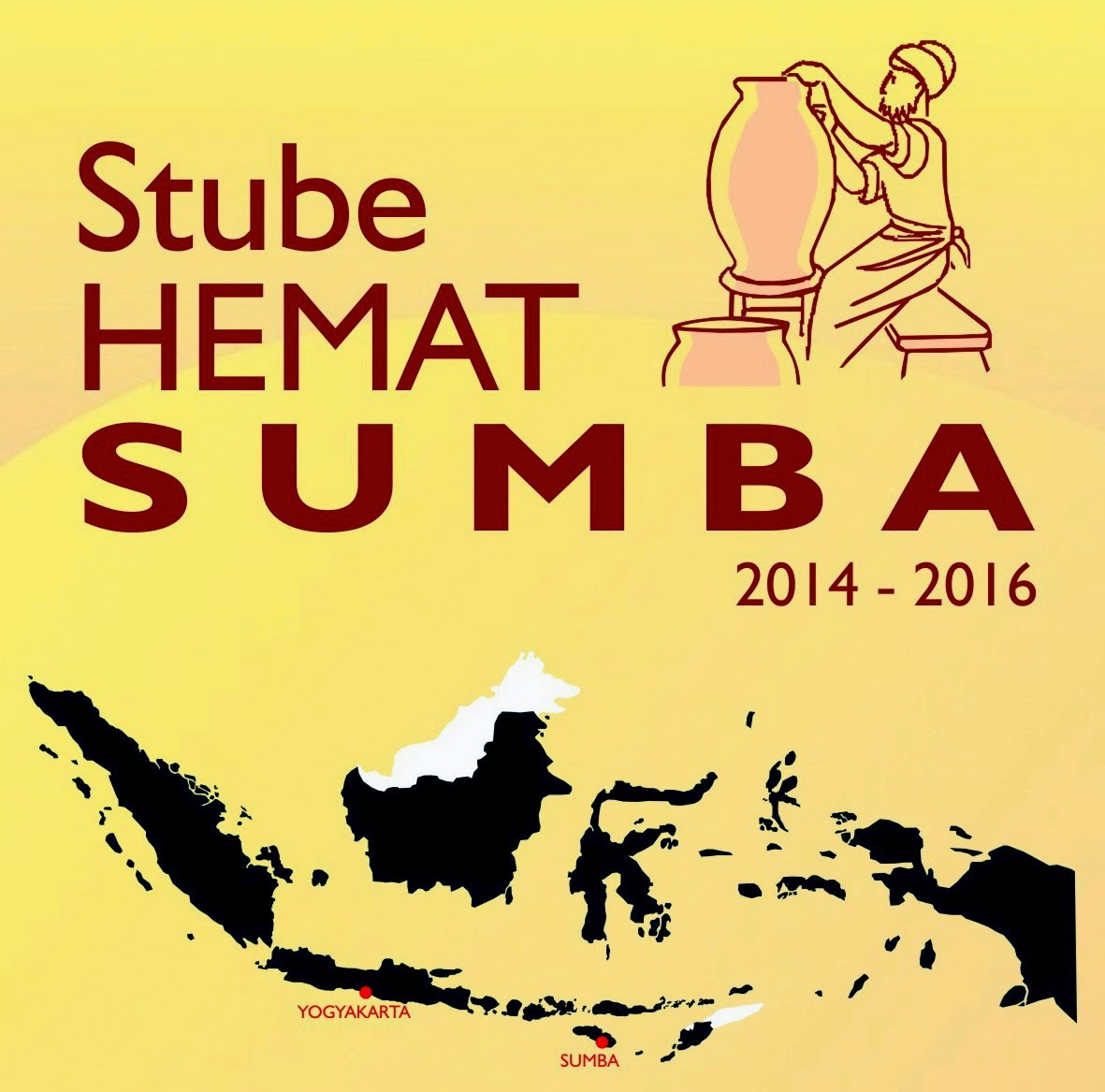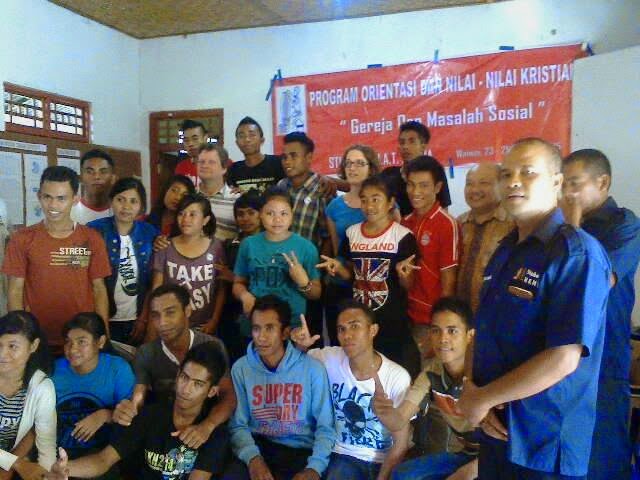Exploring Sumba: Sarloce and Julianti Break the Limit and Share Creativity
Tuesday, 1 December 2015by adminstube
Thirty days in Sumba is a precious opportunity. Not everyone can visit Sumba and enjoy the natural beauty, unique culture and local people’s life. Two students, the activists of Stube-HEMAT Yogyakarta have courage to answer the challenges of Exploring Sumba: adventures to discover new experiences and share the knowledge they have.
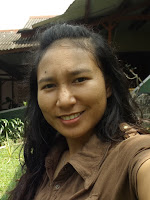 Sarloce Apang, from Buli, East Halmahera, North Maluku is an alumnus of Institute of Technology in Yogyakarta. Loce, she is often called, held socialization of optimizing house yard to plant papaya and tomatoes, practice to make cashew fruit syrup and held discussion with students and activists of Stube-HEMAT Sumba, Waingapu.
Sarloce Apang, from Buli, East Halmahera, North Maluku is an alumnus of Institute of Technology in Yogyakarta. Loce, she is often called, held socialization of optimizing house yard to plant papaya and tomatoes, practice to make cashew fruit syrup and held discussion with students and activists of Stube-HEMAT Sumba, Waingapu. Loce invited young people to optimize house yard by planting papaya and tomatoes. This activity was held at Yulius Anawaru’s house, a Stube-HEMAT Sumba team. Papaya seedlings need special treatment before sowed. They need to be soaked in warm water for 24 hours. After that, prepare the planting media which consist of composted pig manure, goat manure and wood pulp. The planting media is inserted into thirty plastic bags. The next day, papaya seeds that have been soaked was planted in plastic bags and need twelve days to sprout and grow.
Loce invited young people to optimize house yard by planting papaya and tomatoes. This activity was held at Yulius Anawaru’s house, a Stube-HEMAT Sumba team. Papaya seedlings need special treatment before sowed. They need to be soaked in warm water for 24 hours. After that, prepare the planting media which consist of composted pig manure, goat manure and wood pulp. The planting media is inserted into thirty plastic bags. The next day, papaya seeds that have been soaked was planted in plastic bags and need twelve days to sprout and grow. The next activity is a practice to make cashew fruit syrup held in GKS Kanjongan Bakul. Why is cashew? Because cashew is only used as pig food, though actually it contains vitamins that are beneficial for human body. If the fruit is consumed directly, it tastes 'sour' but once processed into syrup, its taste become much more delicious. Ingredients needed were ripe cashew fruit pulp, sugar, salt and lemon. First, the cashew fruit is cut into pieces and then soaked in salt water for four hours, then steamed for 15-20 minutes. After that, blend them until smooth and then filtered. Boil and stir cashew fruit juice plus lemon juice until boiled.
The next activity is a practice to make cashew fruit syrup held in GKS Kanjongan Bakul. Why is cashew? Because cashew is only used as pig food, though actually it contains vitamins that are beneficial for human body. If the fruit is consumed directly, it tastes 'sour' but once processed into syrup, its taste become much more delicious. Ingredients needed were ripe cashew fruit pulp, sugar, salt and lemon. First, the cashew fruit is cut into pieces and then soaked in salt water for four hours, then steamed for 15-20 minutes. After that, blend them until smooth and then filtered. Boil and stir cashew fruit juice plus lemon juice until boiled.Loce also interacted with Child Fund activist who made 'manggulu', a Sumbanese food. She also visited and held a dialogue with the activists of Wahana Visi Indonesia (WVI), a Non Governmental Organization (NGO) that accompany the development of society. Loce discussed problems faced by children and women in Sumba. In relation with student activities, Loce joined a discussion held in GMNI which addressed the need of young generation to turn back to their village and rebuild his village.
 Another participant is Julianti Marbun, an alumnus of the University of Gadjah Mada, who is an activist of Stube-HEMAT Yogyakarta. With her topic about Human Resources, Health and Creativity, Julianti explained that health is related with community healthy lifestyle and development of herb lemongrass. Environment is related with strengthening human resources on lifestyle in healthy environment, like early treatment of malaria utilizing lemongrass. Then, the development of creativity through environmental education was done for children, youth, farmers' groups and members of the church. Strengthening of community management is necessary to maintain the relationship between the community, church and nature.
Another participant is Julianti Marbun, an alumnus of the University of Gadjah Mada, who is an activist of Stube-HEMAT Yogyakarta. With her topic about Human Resources, Health and Creativity, Julianti explained that health is related with community healthy lifestyle and development of herb lemongrass. Environment is related with strengthening human resources on lifestyle in healthy environment, like early treatment of malaria utilizing lemongrass. Then, the development of creativity through environmental education was done for children, youth, farmers' groups and members of the church. Strengthening of community management is necessary to maintain the relationship between the community, church and nature.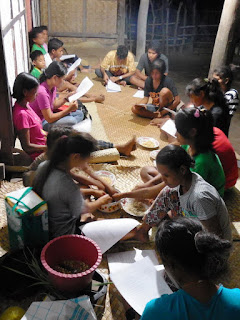 The community management empowerment was held in Rinjung Pahammu farmers group. The group discussed 'creative and innovative thinking' in developing ideas that produce a work towards creative economy concept. Julianti also introduced a concept of environmental and sanitation education among children with Non Governmental Organization (NGO) World Vision Indonesia (WVI) in Child Protection Agency (LPA), Waingapu. As a student activist, Julianti also held a dialogue with Indonesian National Student Movement (GMNI) activists about conservation of environmental resources and the utilization of local wisdom-based environment.
The community management empowerment was held in Rinjung Pahammu farmers group. The group discussed 'creative and innovative thinking' in developing ideas that produce a work towards creative economy concept. Julianti also introduced a concept of environmental and sanitation education among children with Non Governmental Organization (NGO) World Vision Indonesia (WVI) in Child Protection Agency (LPA), Waingapu. As a student activist, Julianti also held a dialogue with Indonesian National Student Movement (GMNI) activists about conservation of environmental resources and the utilization of local wisdom-based environment.Julianti reminds the students and activists of Stube-HEMAT Sumba who have learned with her to keep their spirit of learning and be creative in applying knowledge and skills usefull for others, especially people of Sumba. (TRU).
PROGRAM ON EDUCATION AND LITERACY Still Illiterate, How Could? At GKS Kanjonga Bakul, On November 20 – 22, 2015
Monday, 23 November 2015by adminstube
‘Long live education’, a term that we often hear, and it is a slogan for those who realize that the process of learning and education is important because it is the gate to know the world around him/her. Learning is not limited by age and gender, which means that this process should be experienced by every one.
The awareness of the importance of education should be the principle of society, especially in Sumba, an island in the province of NTT which has many potencies of natural resource and cultural diversity as well-known for "Island of Marapu". It is an irony of course when the natural and cultural wealth is not matched with the intellectual richness and competency of its human resource. The NTT’s statistics data in 2013, showed that 240.000 residents of East Sumba or 11% are still illiterate. This group is a group of ages above 10 years. The great number of illiterate residents in Sumba is a phenomenon that needs special attention. This situation could be one of factors that causes underdevelopment in various fields.
The solutions to eradicate illiteracy and to promote education is the responsibility of all stakeholders. As an institution that focused on social problems, especially education, Stube-HEMAT Sumba is expected to find solution and answer related with education in Sumba through a training on Education and Literacy with the theme "Still Illiterate, How Could?” A training which oriented to students and church youth was held on November 20-22, 2015 at GKS Kanjonga Bakul, Praihambuli, East Sumba. The training was attended by 30 student participants from STIE Kriswina Sumba, STT GKS Lewa, STT Terpadu, Waingapu, Sumba Sandlewood Academy and some church youth in East Sumba.
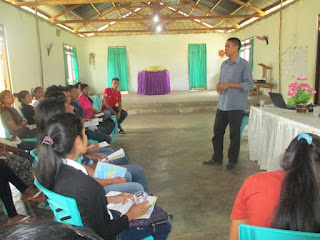 The facilitator in this training, such as Frans Wora Hebi, a cultural practitioner who has written some articles about the potency and culture of Sumba until today. He has expectations to young people not to lose their identity with a touch of Sumba culture and preserve it through times. Another facilitatort was Yanto Njuka Tehik, SE, M.Sc., an activists of Stube-HEMAT Sumba when he was a student and currently he becomes a lecturer at STIE Kriswina, Sumba. He encouraged young people to be the initiator of improvement of education quality that can be started from themselves by reading and writing as their habbits. The Department of Youth Education and Sports in East Sumba region, talked about the condition of education in East Sumba and the process of identifying illiterate people.
The facilitator in this training, such as Frans Wora Hebi, a cultural practitioner who has written some articles about the potency and culture of Sumba until today. He has expectations to young people not to lose their identity with a touch of Sumba culture and preserve it through times. Another facilitatort was Yanto Njuka Tehik, SE, M.Sc., an activists of Stube-HEMAT Sumba when he was a student and currently he becomes a lecturer at STIE Kriswina, Sumba. He encouraged young people to be the initiator of improvement of education quality that can be started from themselves by reading and writing as their habbits. The Department of Youth Education and Sports in East Sumba region, talked about the condition of education in East Sumba and the process of identifying illiterate people.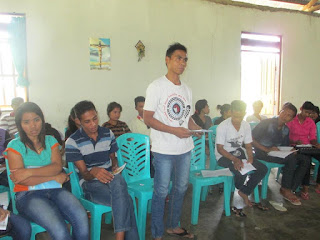 The participants’ responses in this training is very good. Their enthusiasm was seen during the question and answer session in order to reveal more information and answer the curiosity of the participants about Sumba culture. One of the follow-up activities of the training was a collection of participants writings about folklore and culture of Sumba. This collection of writings will be compiled into a children's book reading. The book of folklore is expected to attract people to read and to be a solution to eradicate illiteracy, even the community know their own culture from early age. (DUD).
The participants’ responses in this training is very good. Their enthusiasm was seen during the question and answer session in order to reveal more information and answer the curiosity of the participants about Sumba culture. One of the follow-up activities of the training was a collection of participants writings about folklore and culture of Sumba. This collection of writings will be compiled into a children's book reading. The book of folklore is expected to attract people to read and to be a solution to eradicate illiteracy, even the community know their own culture from early age. (DUD).From Sumba to Yogyakarta: Finding Interests and Developing Talent
Monday, 19 October 2015by adminstube
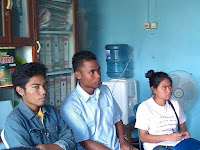 In 2015, Stube-HEMAT Sumba sent six students and youth to learn for one month in Stube-HEMAT Yogyakarta. The first group consisted of Yakoba Pindi Ana Jawa Ratundima (Theology Institute”Terpadu”), Dhany Adrian Apriyanto Umbu Tunggu (Economy Sciences Institute “Kriswina”) and Nikson Retang (Poultry Academy). They departed from Waingapu in August using KM Awu, a passanger ship.
In 2015, Stube-HEMAT Sumba sent six students and youth to learn for one month in Stube-HEMAT Yogyakarta. The first group consisted of Yakoba Pindi Ana Jawa Ratundima (Theology Institute”Terpadu”), Dhany Adrian Apriyanto Umbu Tunggu (Economy Sciences Institute “Kriswina”) and Nikson Retang (Poultry Academy). They departed from Waingapu in August using KM Awu, a passanger ship. During the program in Yogyakarta, Dhany and Nikson learned agriculture in Joglo Tani, Sleman. They were mentored by TO Suprapto, a practitioner of integrated farming system, who combines various elements in agriculture including farm workers, land, irrigation of crops and livestock. The water from a ditch is flowing into fish ponds and it waters chilli plants, mustards, kale and spinach. From the fish ponds, water is flowing into coops to nurture brood of ducklings. Then, water flows into coops for laying ducks and finally flows to the rice fields. The duck eggs from Joglo Tani are often purchased by local people. They sell duck eggs and also produce salted eggs. Dhany and Nikson realized that the method has not been developed in Sumba.
During the program in Yogyakarta, Dhany and Nikson learned agriculture in Joglo Tani, Sleman. They were mentored by TO Suprapto, a practitioner of integrated farming system, who combines various elements in agriculture including farm workers, land, irrigation of crops and livestock. The water from a ditch is flowing into fish ponds and it waters chilli plants, mustards, kale and spinach. From the fish ponds, water is flowing into coops to nurture brood of ducklings. Then, water flows into coops for laying ducks and finally flows to the rice fields. The duck eggs from Joglo Tani are often purchased by local people. They sell duck eggs and also produce salted eggs. Dhany and Nikson realized that the method has not been developed in Sumba.
Yakoba Ana, a student majoring Christian Education, went to Sanggar Anak Alam (Salam) Yogyakarta, and observed learning process which gave children freedom to develop based on their talents. The opportunity to dialogue with Mrs. Wahya, the founder of Sanggar Anak Alam encouraged her to devote her knowledge in Sumba.
 Then, sand farmland in Samas organized by Mr. Bandi became a place for Yakoba Ana and Dhany to learn dried agriculture. Both learned not only techniques to process dry sand into a ready field for planting, but also improved knowledge on the independence of farmers to provide fertilizers and pesticides.
Then, sand farmland in Samas organized by Mr. Bandi became a place for Yakoba Ana and Dhany to learn dried agriculture. Both learned not only techniques to process dry sand into a ready field for planting, but also improved knowledge on the independence of farmers to provide fertilizers and pesticides.Nikson learned pig farm in Kadipiro in order to get additional knowledge about pig farm, how to select sows, how to maintain the water quality, food, vitamins also its piggery. Sumbanese are so familiar with pig, because pig is used as means of custom and additional family income.
 In Yogyakarta, they also joined marine economy training held Stube-HEMAT Yogyakarta. The trainees interacted directly with marine life, fishermen and marine economic problems. Through this training, participants were aware about the marine potencies in Indonesia and it will strengthen the bargaining power of the local fishermen. They should find breakthrough or new discovery for the marine economic growth, especially in Sumba. Yakoba Ana studied at Baros Mangrove conservation area, Bantul, and Nikson observed the lives of fishermen in Muncar, Banyuwangi, while Dhany interacted with the fishermen at port Sadeng, Gunungkidul.
In Yogyakarta, they also joined marine economy training held Stube-HEMAT Yogyakarta. The trainees interacted directly with marine life, fishermen and marine economic problems. Through this training, participants were aware about the marine potencies in Indonesia and it will strengthen the bargaining power of the local fishermen. They should find breakthrough or new discovery for the marine economic growth, especially in Sumba. Yakoba Ana studied at Baros Mangrove conservation area, Bantul, and Nikson observed the lives of fishermen in Muncar, Banyuwangi, while Dhany interacted with the fishermen at port Sadeng, Gunungkidul.
 The second group consisted of Norman Tamu Ama (Economy Institute “Kriswina”), Anthonius Landu Jawa (Arta Wacana University, Kupang) and Hermina Tamu Rambu (Theology Institute GKS Lewa)departed from Waingapu in October 11, 2015.
The second group consisted of Norman Tamu Ama (Economy Institute “Kriswina”), Anthonius Landu Jawa (Arta Wacana University, Kupang) and Hermina Tamu Rambu (Theology Institute GKS Lewa)departed from Waingapu in October 11, 2015. Topics about Credit Union (CU), handicraft and tourism development became the main topic for them. In the begining they visited Student CU UGM, Malioboro, Vredeburg Fortress and Taman Pintar (an educational park).
Topics about Credit Union (CU), handicraft and tourism development became the main topic for them. In the begining they visited Student CU UGM, Malioboro, Vredeburg Fortress and Taman Pintar (an educational park). Next, Norman, Anthon and Hermina practiced bamboo crafts, using Cendani, a small bamboo but this sort is very strong. They made clothes hanger, lanterns and lamp shade. The materials about CU covered save and loan simulation that they learned from the board of CU in Nyutran village, Yogyakarta. It is expected that they will be able as initiator CU in Sumba to fight against moneylenders. The practice creating craft from mussels was held in the residence of Mrs. Maryati, a woman crafter in Rejosari Gunungkidul. This activity trigered creative ideas how to make craft based on shells material may be developed in Sumba.
Next, Norman, Anthon and Hermina practiced bamboo crafts, using Cendani, a small bamboo but this sort is very strong. They made clothes hanger, lanterns and lamp shade. The materials about CU covered save and loan simulation that they learned from the board of CU in Nyutran village, Yogyakarta. It is expected that they will be able as initiator CU in Sumba to fight against moneylenders. The practice creating craft from mussels was held in the residence of Mrs. Maryati, a woman crafter in Rejosari Gunungkidul. This activity trigered creative ideas how to make craft based on shells material may be developed in Sumba. Another activities they follow were discussions of economic and tourism development in Sumba with Ir. Hero Darmawanta, M.T, board of Stube-HEMAT member and discussion about Youth and Social Movements with Eko Prasetyo (Social Movement Institute).
Another activities they follow were discussions of economic and tourism development in Sumba with Ir. Hero Darmawanta, M.T, board of Stube-HEMAT member and discussion about Youth and Social Movements with Eko Prasetyo (Social Movement Institute).
At the end of the program, participants committed that they would share their experiences and apply knowledge and skills they have learned during the program in Yogyakarta both to friends of Stube-HEMAT Sumba and community of Sumba. It’s time to prove skills and knowledge devoted to Sumba. Let's do good works! (TRU).
English and The Gorgeous Sumba English Class of Stube-HEMAT Sumba
Monday, 13 July 2015by adminstube
"Let's talk using English!" Such challenge is often avoided by most students, because they don’t have enough vocabulary to speak in English. However, for some, it is assumed as a challenge that must be faced. That’s right, speaking is a combination of knowledge, skills and art, so one’s ability to speak will be growing better when it is done continuously. Similarly in Sumba, youth and students should speak English among themselves to help them to be familiar with the language and develop communication among people in the midst of language diversity in the world, variety of science and knowledge and to compete in global market.
 Stube-HEMAT Sumba has English class program by introducing local content of natural beauty of Sumba. It is expected that the learners will be familiar with the topic. "Let's Talk: The Gorgeous Sumba" is a self-learning module which is independently compiled by Stube-HEMAT. This book contains brief readings and dialogues that introduce a variety of natural potencies, cultural uniqueness and figures giving a positive contribution to Sumba. The beauty of beaches and waterfalls represent the unique natural potencies of Sumba. Traditional houses in the traditional village and the splendid grave stones become magnet of Sumba culture, and it is completed with the works of Yacob Tanda and Gideon Mbiliyora at the end of this book. In fact, most of participants even know some new places in Sumba written in the book for the first time after reading the module! They feel so curious and decide to visit and prove the beauty and uniqueness of those places.
Stube-HEMAT Sumba has English class program by introducing local content of natural beauty of Sumba. It is expected that the learners will be familiar with the topic. "Let's Talk: The Gorgeous Sumba" is a self-learning module which is independently compiled by Stube-HEMAT. This book contains brief readings and dialogues that introduce a variety of natural potencies, cultural uniqueness and figures giving a positive contribution to Sumba. The beauty of beaches and waterfalls represent the unique natural potencies of Sumba. Traditional houses in the traditional village and the splendid grave stones become magnet of Sumba culture, and it is completed with the works of Yacob Tanda and Gideon Mbiliyora at the end of this book. In fact, most of participants even know some new places in Sumba written in the book for the first time after reading the module! They feel so curious and decide to visit and prove the beauty and uniqueness of those places.
 "I think this book is good, simple but interesting, because we can learn English in a different way, we are led not only to read and interpret it, but we also learn to know our surroundings, especially waterfalls that we had not known yet. The test that records us using video is very exciting", said Ana Ratundima. Elsi commented, "I think this English class is good and very useful for youth here, because we learn English with Sumba local context. It is interesting to learn it”.
"I think this book is good, simple but interesting, because we can learn English in a different way, we are led not only to read and interpret it, but we also learn to know our surroundings, especially waterfalls that we had not known yet. The test that records us using video is very exciting", said Ana Ratundima. Elsi commented, "I think this English class is good and very useful for youth here, because we learn English with Sumba local context. It is interesting to learn it”.According to Salmon Pandarangga, S.Si., M.Si, the instructor, the participants showed their enthusiasm toward the material given, in fact, their capabilities must be improved, and they were encouraged to make learning groups. It will help them to promote Sumba to the world. Trustha Rembaka, S.Th, the coordinator of Stube-HEMAT Yogyakarta, also agreed with his opinion. Trustha also became an instructor for several meetings while he was in Sumba. "The participants seemed enthusiastic in learning English although several times when they found new words, they had to look up the dictionary to find the meanings. As a variation, several meetings were held outdoor, under the sandalwood trees to avoid heat on tin house roof in Waingapu. At the end of the program, the participants had a reading-text test, Trustha explained.
Let’s promote Sumba in English. (TRU)
Share Knowledge and Explore Sumba With Stube-HEMAT Sumba (participants of Exploring Sumba program)
Tuesday, 7 July 2015by adminstube
On July – August 2015 Stube-HEMAT Yogyakarta sent three students who study in Yogyakarta to join Exploring Sumba. They were sent to Sumba to explore cultures as well as share their knowledge and skills. Started on July 4, 2015, each student shared their skills and knowledge they have.
 |
| Yoel Yoga Dwianto |
Yoel Yoga Dwianto, a student from Lampung who studies Theology at Christian Religion College (STAK) Marturia Yogyakarta, felt happy to come to Sumba and met many new friends in Stube-HEMAT Sumba. "I’ve never thought before that Sumba is more beautiful than I’ve ever imagined. I hope the program I brought related with preparing sermons and farmers will be useful for many people, especially for activists of Stube-HEMAT Sumba", he said. Yoel hoped that Stube-HEMAT Sumba’s activists are eager to study harder, so they will be more active as well as Stube-HEMAT Yogyakarta’s.
 |
| Indah Theresia |
Indah Theresia Margaretha Boru Siahaan, a student from North Sumatra, who studies accounting at Mercu Buana University of Yogyakarta said that this is her first time to visit Sumba. "It’s nice because Stube-HEMAT Yogyakarta entrusted me to come here and share knowledge with students colleagues in Stube-HEMAT Sumba. I hope the entrepreneurship program I share about will encourage students in Stube-HEMAT Sumba", she said.
 |
| Elliana Hastuti |
The third participant is Elliana Hastuti, familiarly called Ana, a student from Solo, Central Java. Ana is a fifth semester student of Psychology at Sanata Dharma University. She revealed that her chance to visit Sumba is like a dream, she can meet friends of Stube-HEMAT Sumba. "I’ve never imagined that I could visit Sumba”, she said. “I hope that students of Stube-HEMAT Sumba and I may share knowledge each other, so I also learn something from them. I will share psychology and Sunday school creative teaching, especially children psychology development approach. It may be useful for them and many Sunday school teachers”, she added.
Welcome friends from Stube-HEMAT Yogyakarta. Have a nice interaction, adaptation, service and activities! (JUF)
Student’s Concern on Sandalwood Tree A Socialization and cultivation of sandalwood Tree at Schools in Waingapu, East Sumba, NTT
Monday, 22 June 2015by adminstube
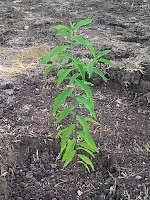 Sandalwood (Santalum album Linn) is a kind of plant originated from Indonesia that can grow well in East Nusa Tenggara, includes Sumba and Timor. The Sandalwood trees growing in Sumba and Timor produce high quality sandalwood. Good quality sandalwood will produce essential oil yield and large amount of wooden porch. So that a sandalwood tree has a high economic value.
Sandalwood (Santalum album Linn) is a kind of plant originated from Indonesia that can grow well in East Nusa Tenggara, includes Sumba and Timor. The Sandalwood trees growing in Sumba and Timor produce high quality sandalwood. Good quality sandalwood will produce essential oil yield and large amount of wooden porch. So that a sandalwood tree has a high economic value.Ironically, sandalwood trees are rarely found in East Sumba recently. It turns out that many problems occurred, such as huge exploitation, illegal logging and fire. Unfortunately, there is no adequate effort to cultivate sandalwood tree.
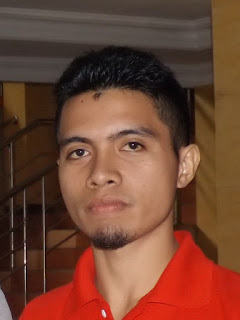 |
| Wilton P.D. Ama |
The cultivation of Sandalwood tree is very essential urgently needed by this island to protect sandalwood tree form its extinction. Through Local Exposure program, Stube-HEMAT Yogyakarta encourages Wilton Pascalis D. Ama, a student of STIPER, Yogyakarta Agricultural Institute to initiate socialization and planting sandalwood tree at schools in Waingapu, East Sumba. These activities were held in some senior high schools covering; Waingapu 1 State Senior High School (SMA N 1 Waingapu), Waingapu 2 State Senior High School (SMA N 2 Waingapu), Waingapu 1 Vocational High School (SMK N 1 Waingapu), PGRI Senior High School (SMA PGRI Waingapu), Andaluri Catholic Senior High School (SMAK Andaluri), Muhammadiyah Senior High School (SMA Muhammadiyah) and Payeti Christian Senior High School (SMA Kristen Payeti).
These activities aimed to increase population of sandalwood tree and build youth awareness about sandalwood tree. The principal of each school gave good response and allowed the activities held there. The socialization and planting trees were held for six days (14 - 19 June 2015) and took place in the morning and afternoon, according to school’s schedule. These activities also involved student committees (OSIS) and some organizations such as environment groups and Scout of Wana Bakti as participants which show great enthusiasm.
Many questions, comments and suggestions raised during the session seems to encourage participants to increase high quality of sandalwood population in Sumba. One of the students said that the socialization implemented here is not enough to build and enhance the fragrance of sandalwood. It needs more campaigns related to sandalwood, so that concern of sandalwood tree will be awakened in the future". (WP)
Livestock Training Program of Stube-HEMAT Sumba Could We Expect More on Livestock? May 22 – 24, 2015 at GKS Okanggapi, the branch of GKS Umamapu
Monday, 25 May 2015by adminstube
Sumba is known as sandalwood island because of its sandalwood tree and Sandalwood horse. East Sumba has tropical climate, with its area 7.000,50 km2 and 223.568 ha of savanna area, equivalent to 32.91% of the total area of East Sumba. East Sumba has a lot of potencies but it has not optimalized yet, such as tourism, livestock, marine and fisheries.
One of the promising potency is livestock. East Sumba is known as one of the suppliers of large animals, such as horses, cows and buffaloes that should be optimized. However, the problems should be faced are cattle theft, cattle diseases and market low price.
Stube-HEMAT Sumba observes such condition above, then takes chance to empower students and young people to be more responsive to the recent situation. Through a livestock training held on May 22 – 24, 2015 at GKS Okanggappi, the branch of GKS Umamapu, the participants consisting of students and youth learned a lot of things, such as livestock potency, animal disease and livestock safety. In addition, participants give suggestions to the department of animal husbandry and police department in order to optimize the livestock potency in East Sumba.
The trainees consists of 27 participants, male and female students from various campuses in East Sumba, such as STIE Kriswina, STT GKS Lewa, Integrated-STT Waingapu and AKS Peternakan and two participants from GKS Kanatang. Stube-HEMAT Sumba invited Samuel Rundi, a veterinarian having livestock experiences in East Sumba as the facilitator. He said that the biggest challenge to run a livestock is the lack of fodder in dry season, while fodder is abundant in rainy season. In addition, the cattlemen still use traditional breeding system and there is also much threat of animal theft.
One of the participants, Nikson K.W. Laki, a Kriswina STIE student coming from Kanatang, East Sumba said, "I’m very happy with this training, because I can learn how to manage livestock and open the prospect of business to improve the economy condition of the society."
The potency of livestock is expected to be maximally developed as one of the prospective sector for the regional economy development. As a field learning, the participants visited a livestock at Wanggawatu, Kambera managed by Umbu Kudu. Participants are expected to have more interest to apply the knowledge of livestock they have learned in the training. (DNY).
One Story Fragment in Marapu Land
Wednesday, 22 April 2015by adminstube
Time is hard to understand,
But let me sure,
Time has a pleasant arrangement
Time brings us to find truly friends
But, time also lead us to be apart
Among us and them
The Exploring Sumba program from Yogyakarta to Sumba leaves memories and unforgettable experiences in which we can share knowledge and everything. This chance brings us to meet Petrus Maure and Elisabet Novia Listiawati.
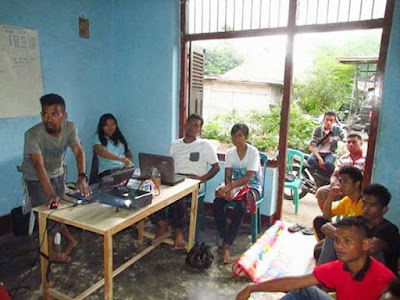 Petrus shared his knowledge about multi-media, namely Photoshop and CorelDraw, while Elisabet shared her knowledge related with organic farming and journalism. Started from March 17 – 10 April 2015 we were doing activities together. The remaining days from April 11 – 15 we accompanied them to enjoy nature of East Sumba before they returned to Yogyakarta.
Petrus shared his knowledge about multi-media, namely Photoshop and CorelDraw, while Elisabet shared her knowledge related with organic farming and journalism. Started from March 17 – 10 April 2015 we were doing activities together. The remaining days from April 11 – 15 we accompanied them to enjoy nature of East Sumba before they returned to Yogyakarta.Mondulambi beach and Manubara waterfall were two places that we have promoted to them. They also observed people’s life in Matawai Harangi, Mondulambi village, one of church service point, where people lived in simplicity and facility limitation.
Eventhough we met Petrus and Elisabet for just a moment, but we felt a meaningful feeling of togetherness. We believed that knowledge and experience we have gained will be useful for the sake of humanity besides friendship among young students. (DNY) ***
Welcome to Sumba! Sharing Knowledge and Learn Together The participants of Exploring Sumba Program from Stube-HEMAT Yogyakarta
Thursday, 19 March 2015by adminstube
After their travel from Yogyakarta and transited in Denpasar, finally Bung Pet and Elis, their nicknames, were out of the Nam Air plane’s door and setting foot on Sumba. "Welcome to Sumba!" said Yulius Anawaru, one team of Stube-HEMAT Sumba when he met Petrus Maure and Elisabet Novia Listiawati in Airport Umbu Mehang Kunda, Waingapu.
Surely, this was their first opportunity to come and set foot on the land of Sumba, known as Marapu Island. Apriyanto Hangga, team of Stube-HEMAT Sumba caught a shocked expression from the two participants of exploring Stube HEMAT Sumba through their facial expression when they were out of the airport and looked around the road to Stube-HEMAT Sumba secretary. Who were they and what were they going to do in Sumba? The two were the participants of Exploring Sumba held by Stube-HEMAT Yogyakarta. They would be in Sumba for thirty days and share their knowledge and skills to students and young people of Sumba.
Arriving at the secretariat of Stube-HEMAT Sumba located in Payeti, Waingapu, Rev. Dominggus Umbu Deta, S.Th., the coordinator of Stube-HEMAT Sumba revealed that Exploring Sumba program was a very beneficial program and it supported programs in Stube-HEMAT Sumba, for example, agriculture program, journalism and computer multimedia. In some programs, both team and participants were limited in its understanding, so the participants of Exploring Sumba were truly helpful for Stube-HEMAT Sumba.
"For the participants of Exploring Sumba, would share knowledge as much as possible, even though in a limited time, within the next few days, the objectives of some programs can be achieved", Rev. Domi hoped. He also reminded them that there would be challenges in Exploring Sumba because the students had different disciplines, so the response and understanding of each participant was also diverse. So, each program presented in a joint learning process certainly would take times because it may be acceptable if the work program can be followed well by participants. "The previous participants of Exploring Stube HEMAT Sumba was also faced the same challenge", he said.
Petrus Maure planned to have computer training specifically how to design using CorelDraw and Photoshop, while Elis was eager to socialize and assist how to optimize house yard with medicinal families plant based on sustainable agriculture. They both stayed in Yulius Anawaru’s house, team of Stube-HEMAT Sumba located in Wanggawatu, District of Kambera, East Sumba. (TRU)
Still Young, We Make It! Stube-HEMAT Sumba and Women's Commission of GKS Synod In GKS Waingapu, on February 27, 2015
Saturday, 28 February 2015by adminstube
"All people by nature is beauty because we are the best creation of the Lord," said Anthony Landu Jawa, familiarly called Anthony, in the beginning of training. The training of making shells and coral flowers is held for members of Women's Commission of GKS Synod. The shells and coral craft is originally made by two young boys in East Sumba.
On Friday, February 27, 2015, accompanied by Apriyanto Hangga, Anthon, Dani and Apriana represented Stube-HEMAT Sumba delivering a training how to design flower-shaped table decoration made of shells and corals in GKS Waingapu.
This training as one of Leader Meeting activities of Women's Commission of GKS Synod was hosted by GKS Waingapu. There were about 50 women present at the event as therepresentative of each Classis in Sumba. This event isactually annual agenda of Women’s Commission of GKS Synod. As additional program to equip the members with a certain skill,it also provides an empowerment training. There are several kinds of additional skills, such as training how to decoratechurch, how to cook local food called ‘iwi’ in Sumba, how to make bamboo trays, how to make craft from shells and coral flowers, and how to make use patchwork into pendant and hair band.
Dhany, Anthony and Apriana as Stube-HEMAT Sumba’s envoys provided a training to make craft of shells and coral flowers. Interestingly, they were the youngest facilitators among others, and it showed the existence of Stube-HEMAT Sumba in guiding and empowering youth.
"We are pleased and proud of the chance given to us, sowe can share what we have with others. In addition, our flower craft received many compliments from all participants and committee because it is interesting, and we were asked to bring flowers craft that ready for sale and used as souvenirs for the participants" said Dany representing other friends. (DNY).
Training Program of Stube-HEMAT Sumba CHURCH & SOCIAL PROBLEMS Wai Wei, January 23 – 25, 2015
Tuesday, 27 January 2015by adminstube
The current social problem flush turns more and morecomplex, both in society and church life. Such conditionrequires intervention from many stakeholders. Church as one of the society elements needs to be proactive to observe social problems, that’s in line with the calls of a church:fellowship, service and preserve faith.
During the ministry, Jesus declared not only His death, resurrection and ascension, but also heal the sick, fed the hungry, caredfor the poor, casted out demons and fought against injustice as His way to presence of kingdom of God. Likewise, church should be able to see many social problems that exist in society or congregation.
As written in Isaiah 61: 1-2 'Spirit of the Lord is upon me, because the Lord has anointed me: He has sent me to bring good news to the poor, to help people who are brokenhearted, to proclaim release to those prisoners and to those who confined deliverance from prison, and to notify the grace of God." Based on the verse, Stube-HEMAT Sumba were called to do something by equipping students to deal with and doing action to resolve social problems.
In order to realize goals above, Stube-HEMAT Sumba organized a training, with theme "Church and Social Issues". This event was held in the Hall of Bina Karya Swadaya Foundation, located in Wai Wei, district of Lewa, East Sumba on January 23 – 25, 2015. This event was attended by 26 students from various campuses in East Sumba.
The speakers in this training are Rev. Dr. Tumpal, MPL Tobing, Mag.Theol, (board of Stube-HEMAT) who served school in Jakarta, then, Rev. Umbu Bolu, M.Th, Rev. Irene Umbu Lolo, M.Th, vicar Juliana W. Kilimandu, S.Th, Rev. Dominggus Umbu Deta, S.Th, and I Gusti Made Raspita, an environmental activist in Sumba. Each speaker revealed social problems that exist in Sumba and how the community and the congregation respond them. Speakers also provided input to solve these problems.
The training was very special, because the training was attended by coordinators of Stube in Germany, which gave opportunity to the participants to share experience they gained from each region. There was important message from Angelika, one of Stube coordinator in Germany, she said, "You've got incredible natural resource, and never think to change it, because when you want to change it, you can never go back to the beginning. Your natural resource is very quiet and keep them for the world". This may expressed spontaneously, but for us it is like a great hope imposed to the participants and the community of Sumba.
At the end of the training, participants were invited to visit the plantation around Yayasan Bina Karya Swadaya, to sprout the love of nature, preserve nature and encouraged to use organic fertilizers when managing the farmland. Participants are also expected to be information conveyers to public society, about the important to maintain nature that God has entrusted to manage. (ABN)











